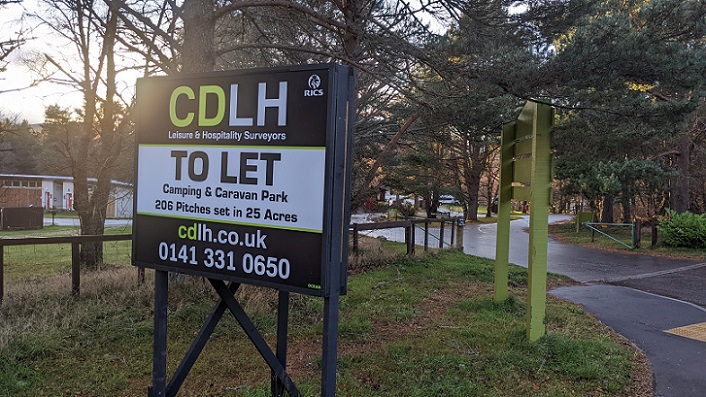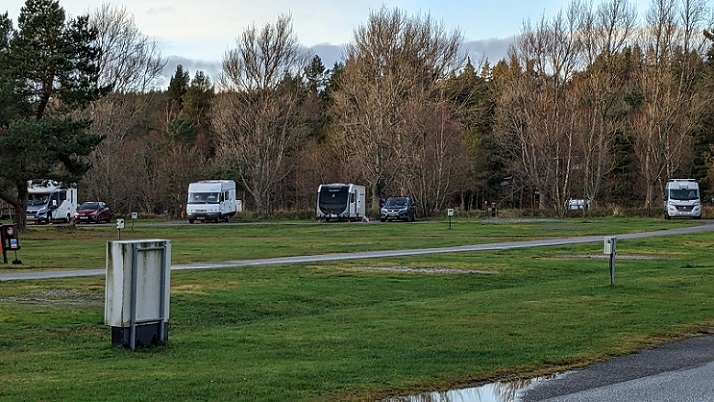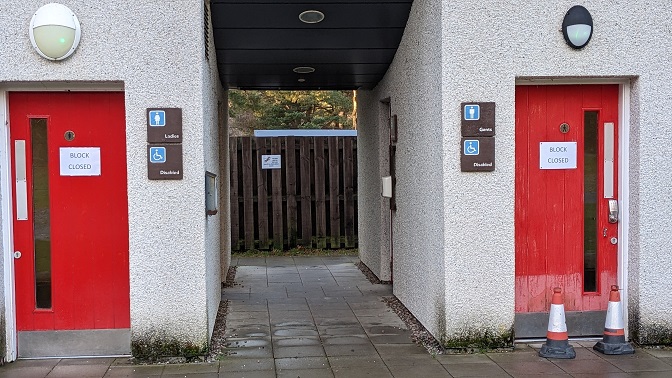
On Monday Forest and Land Scotland (FLS) announced (see here) that a new company called Twinflower will take over the management of the Glenmore campsite from 1st December. It has made no announcement as yet about its other two campsites in the Loch Lomond and Trossach National Park, Cobleland and Cashel, which it put out to tender at the same time (see here) and where the leases were also due to start from 1st December.
The news release was designed to mislead with the headline stating claiming “Campsite Management Company appointed to refresh Speyside’s Glenmore site”. The management team from the Hold Fast Entertainment Company”, carelessly misnamed by FLS as “Holdfast”, have no record in campsite management, just as Natural Retreats had no experience of managing ski resorts when Highlands and Islands Enterprise appointed them to run “Cairngorm Mountain” just up the hill. Both the Strathy (see here) and Herald (see here) reported that Hold Fast is a night club and entertainment business (based at George St in Glasgow). Will there now be an annual music festival on the shores of Loch Morlich?
The news release made no mention of how FLS had excluded the Aviemore and Glenmore Community Trust from taking over the campsite (see here).
The financials
While It is not clear from the news release, there are two financial aspects to the deal FLS have sold the campsite business, which it bought back from “Camping in the Forest” earlier in the year for a so far undisclosed sum – just like HIE up the hill – but is has also agreed to lease the land and facilities at the campsite for £190k a year:

Twinflower Ltd was incorporated as a company on 31st October with a share capital of £100 (see here). The shares were lodged in the name of Brian Fulton, the Director of the company quoted in FLS’ news release. Two days later Twinflower reported a change of control to Donald Cameron Macleod, the second Director of the company, who owns the Hold Fast Entertainment Company. Mr Macleod therefore appears to be the sole owner and Twinflower to be a standalone company with no legal relationship to Hold Fast Entertainment Ltd. That has important contractual implications just as it did at Cairn Gorm where HIE sold the business CML to Natural Assets Investment Ltd but where another company, Natural Retreats, operated it.
Whether Mr Macleod intends to purchase FLS’ campsite business through a capital injection into Twinflower or directly himself and how the deal will be financed is unclear.
Hold Fast, however, just about has the money. A day after FLS’ news release, its latest accounts were published. As Private Eye might say, some coincidence surely? The accounts for the year to 31st March 2022, which are abbreviated and therefore don’t say much, do reveal that Hold Fast’s assets increased significantly in the last financial year, from £83,551 to £338,473 – just over the premium bid price of £315k – while the average number of staff it employed dropped significantly from 22 to 12.

The increase in value in the company appears almost entirely due to the investment of £250k (explained under Note 5) into shares of its subsidiaries.
Why an entertainment business suddenly became awash with cash during a year in which covid restrictions applied is not clear but part of the explanation may lie in the number of staff having almost halved from the previous year.
In the past Hold Fast’s net assets have been more than they are now while the amount of money it owes has increased significantly in the last year:

This is not a sign of financial strength. With the entertainment sector struggling it looks like the management team at Hold Fast was looking to diversify and find a secure source of income. Exactly what is provided by the Glenmore campsite!

Take away the £190k rent and this appears a very attractive business proposition, significant profits guaranteed unlike the ski business at Cairn Gorm!
The Heads of Term for the lease agreement (see here), obtained through FOI, reveals that the tenant will be required to submit a deposit of 6 months rent, ie £95k, but this will be offset by an initial rent free period of four months! Two months rent therefore deposited for a 15 year lease! What a deal compared to those offered by private landlords to people desperate for accommodation!
The Heads of Terms also state “”A Guarantor will be required throughout the term of the lease………….The Guarantor will guarantee 1.5 years rental and other lease obligations enforceable at any time during the lease agreement. A Guarantor may not be required if the tenant/tenant company has high net worth.”
FLS have sold the Glenmore campsite to a person/company backed by far fewer financial assets than the Aviemore and Glenmore Community Trust, whose rent was guaranteed by the billionaire Anders Povslen. But this will only matter if the price they have paid for the business is significantly over FLS’ premium price of £315k and requires them to take out loans. In terms of Mr Macleod/Hold Fast’s financial standing, however, one wonders whether they also bid for Cashel and Cobleland and, if so, why the awards of those contracts have not been announced?
While the question of whether FLS has sold the Glenmore campsite business on the cheap remains to be answered, the much more important issue is that in outsourcing it they have deprived not just Glen More but also Cairn Gorm of a secure source of income. With the snow sports business at Cairn Gorm always likely to struggle financially, an AGCT takeover offered the opportunity to invest profits from Glenmore up the hill and benefit the whole community. Instead, most of those profits are now likely to flow out of the area.
What will FLS get for their money and will there any benefit to Glen More?
In announcing the award of the lease, FLS director of commercial development John Mair claimed:
“Twinflower plans an initial three-year investment programme likely [my emphasis] to include a simplified booking system, additional play facilities and a new community hub, improved tent, caravan, and motorhome pitches, enhanced shower facilities, wifi connectivity and “sustainable measures to manage energy and waste”.
None of these measures appear to require significant investment and although cheap stuff are still only “likely” and will take three years to implement.
Just what the local area is getting is unclear:
“Twinflower emerged as the strongest bid based on their proposed approach to community values”
and
“The new operators have also committed to promoting and using local suppliers and to establishing partnerships with local community groups and charities. They will also introduce a ‘Community Pitch’ initiative which will allocate a percentage of each customer booking to benefit local good causes.”
In addition the Heads of Terms state:
“The Tenant is to provide an updated copy of their Community Engagement Plan by each anniversary of the date of entry, to include a summary of actions taken during the preceding year.”
Just what happens if that plan is not implemented – Natural Retreats made similar promises – and just what qualifies FLS to judge community values when they have deliberately excluded the Aviemore and Glenmore Community Trust from taking over the campsite is unclear.
In my view the only way that Twinflower is going to be able to establish any effective working relationships with the local community and repair the damage done by FLS is if they pledge all their profits to the AGCT. Local politicians, including Kate Forbes MSP, could start calling for that now.
It is also worth noting that unlike the AGCT bid for the campsite, FLS has made no mention of Twinflower offering a ranger base or trying to attract backpackers (which would require lower prices) to relieve the camping pressures around the shores of Loch Morlich. There is no mention either in the tender documentation or FLS’ announcement of what role the campsite might play in any new plan for visitor management in Glen More (the current strategy (see here) has effectively collapsed). This is what happens when a public body like FLS puts money first, fails to work in partnership and reneges on all their other obligations, in this case to support outdoor recreation.
What needs to happen
There are important similarities between the way FLS has sold the Glenmore campsite business to Twinflower and how HIE sold the Cairngorm Mountain Business to Natural Retreats: both involve sales to companies without a proven track record in the respective business, without assets and where the relationship between the real owner and operating company is unclear. The risks on relying on guarantors in such circumstances is high: HIE has still, as far as I am aware, not recouped any of its losses from David Michael Gorton the owner of Natural Assets Investment Ltd which bought CML.
The two businesses, however, are very different and it would take an extraordinary degree of incompetence for the Glenmore campsite not to make a profit.

When I visited the campsite yesterday, there were c25 campervans and caravans on a very wet and windy day, with advertised prices starting at £21.05 a night. That is £500 a night at the depth of the off-season when many of the facilities had been closed by FLS:
 The other similarity between HIE and FLS is how Scottish Ministers have allowed them to put their own financial interests – in HIE’s case with disastrous consequences that has cost the public purse £millions – before the public interest. That was perhaps unsurprising with Fergus Ewing, the Scottish Government Minister responsible for the Natural Retreats debacle, but it is Mairi McAllan, who is minister responsible for both forestry and land reform who supported FLS’s procurement charade, claiming they had followed appropriate procedures.
The other similarity between HIE and FLS is how Scottish Ministers have allowed them to put their own financial interests – in HIE’s case with disastrous consequences that has cost the public purse £millions – before the public interest. That was perhaps unsurprising with Fergus Ewing, the Scottish Government Minister responsible for the Natural Retreats debacle, but it is Mairi McAllan, who is minister responsible for both forestry and land reform who supported FLS’s procurement charade, claiming they had followed appropriate procedures.
What a contrast to the Green MSP, Lorna Slater, who is responsible for NatureScot. She stepped in at the last moment to halt their proposed sale of Kinloch Castle on Rum due to community concerns showing that it would have also been quite possible for Mairi McAllan to do this at Glenmore. Perhaps, as minister responsible for National Parks, Ms Slater could now start advocating to her ministerial colleagues that it is time that both HIE and FLS put the public interest first?
Why were Aviemore and Glenmore Community Trust excluded? This would have been a fantastic community service and the profits could have been reinvested in the community, rather than the pockets of a near-bankrupt Glasgow night club owner. I suspect they would have been much more motivated to provide new and better services as part of a wider vision for the area. What a missed opportunity.
The small print states that there is consent for the construction of 38 lodges in the plan. How many does a lodge sleep? Sound like the situation at Badaguish a few years ago, when the applied, and received permission for a similar number of “pods”, each containing four beds, that would somehow reduce the sleeping capacity of the site. The Highland Council Local Plan at the time had a presumption against providing any further accomodation in the Glenmore area. Will they not rest content until there is continuous development of holiday accomodation, cafes, “attractions”, campsites and campervan parks along the entire route from Aviemore to Cairngorm summit.
Aye. The problem is that the National Park Authority consented to this development a long time ago, it started (probably two holes dug by a spade) and because it did the planning consent is still extant. I have asked the CNPA to cancel it as they say they would never consent to lodges now – we will see!
The issue with lodges, pods and similar replacing camping space is that it pushes the provision upmarket which suits the locals and everybody except those on a limited income looking for a holiday just fine!
There’s a very familiar smell about all this. And it leads to the door of the Scottish government
Possibly doesn’t matter to most users, but there’s a warm feeling of making a local contribution when staying, as we did last month at the community owned, first class caravan/campervan/camping site at Ballater. It’s disappointing that a similar arrangement doesn’t seem to have been made at Glen More.
315K and 190K a year for a bit of otherwise fairly useless land in the middle of nowhere! No wonder it’s 20 quid a night in the depths of the off season.
This is the root problem with so much in the UK, land and property is grossly overvalued.
Somehow it also seems to apply to publicly owned land, as here. Presumably the excuse will be that they mustn’t compete with the private sector, which was mentioned in the discussions around the severely limited Stay the Night scheme. It is not explained why this should be the case and conveniently means that large sums go to the likes of FLS, effectively the government, simply because they are deemed to “own” large tracts of the countryside.